Happy Friday everyone!
If you’re one of the hundreds of new investors to join us from Wealth Mastery - welcome.
I recorded a Zoom session for Wealth Mastery graduates just like yourself with answers to dozens of questions around investing, how to get started, how to act on Peter Diamandis’ recommendations etc. which you can find here.
And if you’ve been with me for a while, you’ll notice a slightly new format today.
Going forward, every two weeks, you’ll receive an Alert - detailing a specific opportunity with 10X upside - in business, investing, or lifestyle design.
I’m doing this to make this newsletter more actionable. More value, less fluff.
My goal is to help you act on opportunities in the new economy - on the edge of where technologies evolve exponentially, sovereign nations rise and fall, fortunes are made, and clever countries compete for remote workers.
My promise to you is to make these Alerts simple, accessible, actionable - and timely.
And what more timely Alert than one on Ethereum.
Ethereum is making a new all-time high today at $2,780 - and for good reason.
Today I’ll explain why - and how you can get in on the action.
So let’s dive right in.
🔥 Here’s what you’ll learn today:
Why should you care about Ethereum?
What the hell is Ethereum actually?
What problem is it trying to solve?
Why did it just reach an all-time high price of $2,780?
Top resources for more information
How to buy Ethereum
How should you value Ethereum?
Ethereum price prediction 🔮
When should you sell your Ethereum?
How much money should you allocate to Ethereum?
The safest places to store Ethereum
How to buy Ethereum directly in your brokerage account
How to earn interest on your Ethereum (up to 30% per year)
💡 Why should you care about Ethereum?
Ethereum was launched in July 2015 and has since become the second-largest cryptocurrency in the world.
It has the potential to transform the face of the Internet over the next decade.
But it’s also one of the best-performing assets of the last 6 years.
If you had bought $1,000 worth of Ethereum at its launch in 2015 - you’d have a cool $1 million today.
That being said, Ethereum still has a long way to go. As of April 2021, it is still one of the most interesting investment opportunities in the world.
🤷 Ok - so what the hell is Ethereum?
Ethereum is a software platform that has 2 main uses:
To support the world’s second-largest cryptocurrency - Ether (more on Ether in a second)
To be the infrastructure platform that powers applications that everyone can use and no one can take down - which is now possible with blockchain technology.
It was built by a 19-year old Canadian/Russian genius called Vitalik Buterin - and is worth $300 billion today.
In perspective, that’s bigger than companies like Nike and Coca-Cola (and bigger than the economy of Finland).
⭐ But first - what’s the difference between bitcoin and Ethereum?
Bitcoin is a digital store of value. For all intents and purposes, you can look at it as digital gold. Its value is derived mainly from its:
scarcity (there will only ever be 21 million bitcoin)
durability (it’s software)
portability (it can be sent anywhere in the world like an email)
divisibility (you can buy 0.00000001 bitcoin)
counterfeit difficulty (has not occurred to date)
In contrast, gold is less scarce, is difficult to move and divide into small units, and expensive to store.
Ethereum, on the other hand, is a network that powers decentralized applications using Ether, its native cryptocurrency.
If Bitcoin is digital gold, you can think of Ethereum as digital oil.
If the current world economy runs on oil, the digital economy could run on Ethereum.
If more applications are built on top of Ethereum - and need Ether to be executed - then the Ethereum network will be more valuable.
🔍 What problem does Ethereum solve?
Bitcoin and Ethereum were built with similar principles in mind - to remove intermediaries.
Intermediaries are everywhere - and behind the scenes, they help us accomplish all sorts of tasks.
For example, Gmail helps you send emails. Your bank helps you send money. Instagram helps you send content to thousands of people. And Uber helps you order a car.
But using intermediaries presents three major obstacles:
Our personal (and financial) data is stored on the servers of companies like Google, HSBC or Facebook which are vulnerable to leaks, hacks, resale, etc.
Intermediaries can censor our access to their services
It’s inefficient and costly
The goal of Ethereum is to give users more power over their personal data and replace intermediaries with smart contracts that automatically execute rules.
Ethereum aims to ensure that if a specific rule is met in a transaction, the transaction is automatically executed - and cannot be censored or slowed down by inefficiencies.
🚗 Take Uber, for example
Today, Uber takes a fee for processing the payment between the driver, Uber and the customer - and for facilitating the actual ride.
Uber also depends on a payment processor (which charges high fees) to process payments between the rider, Uber and the driver.
In the future, smart contracts run on the Ethereum network would allow the payments of the ride to be executed automatically.
This will make transactions cheaper, more efficient and automated.
To be executed, every transaction needs a little bit of Ether.
As a result, as the Ethereum network is increasingly used, the need for Ether increases, which pushes up its price.
This means Ether and Ethereum aren’t exactly the same thing (Ether is a currency, Ethereum is a platform) but for the sake of simplicity, most people (and this Alert) use them interchangeably.
Ethereum is a platform anyone can use to create digital applications. It wants to become the world computer on which a new system is built.
Only 6 years after its launch, it’s become the go-to software for people building the new world of decentralized finance - including the famous NFTs you hear about in the news.
🚀 Why did Ethereum just reach an all-time high of $2,780?
These days, Ethereum is on fire 🔥
During all of last year, Ethereum settled $1.3 trillion in transactions. In the last quarter alone, it settled $1.5 trillion.
Remember, Ethereum transactions require Ether to be executed - so the more transactions are required to be executed, the higher the demand for Ether will be.
Ethereum outflows from exchanges are reaching an all-time high
This means people are using Ethereum in decentralized finance to back loans, buy NFTs and taking self-custody of their money.
Active Ethereum addresses are reaching an all-time high.
🧨 So… why Ethereum NOW?
Ethereum is at a critical crossroad that is likely to push up the price of Ether substantially in the next 18 months.
Here’s why:
Investors can earn up to 25%+ interest per year on their Ether (on top of the capital appreciation) by using decentralized financial platforms. This will likely incentivize more people to buy and hold Ethereum.
(I explain how further down in the alert).
Ethereum is about to undergo a big update in July and another one later this year.
One of these upgrades will take a large amount of Ethereum out of circulation for a while - which will likely push up the price of Ethereum simply on decreased supply.
(I will not cover the specific details of these upgrades here because- but if you want to do your own research, these are upgrades to something called EIP1559 and the migration to proof-of-stake).
Institutional investors will be faster to adopt Ethereum than bitcoin because the initial hurdles of investing in digital assets will already have been cleared with bitcoin.
The story of Ethereum’s future is spreading fast. As Ethereum increases in value relative to bitcoin, more people will notice, which will feed a frenzy of buying.
This is already happening thanks to skyrocketing number of transactions, active addresses, and exchange outflows.
The increased performance and use of Ethereum are likely to keep driving prices (way) up.
🔗 Top resources to learn more
For a deep-dive on Ethereum with founder Vitalik Buterin, check out this podcast with Lex Friedman and this one with Tim Ferriss.
For updates on Ethereum (and Decentralized Finance in general), check out this newsletter.
To understand what the future of finance looks like, watch this video.
And to better understand what Ethereum is likely to become after the next upgrades, check out this link.
If you want to learn how to actually code Ethereum, I encourage you to check out Crypto Zombies, an official coding challenge endorsed by the Ethereum foundation to learn the basics of its programming language, Solidity.
Lastly, if you want to read the entire story of Ethereum and how it came to be, I can highly recommend this book that I personally loved.
💰 How to Buy Ethereum
The easiest way to buy Ethereum is to create an account on a cryptocurrency exchange like Kraken, Coinbase or Binance and fund it through a bank transfer.
Once you are in possession of your Ether, you can either keep it in a vault on the exchange, transfer it to a digital wallet like Exodus, or a hardware wallet like a Ledger Nano S or Trezor.
The difference between the three options comes down to a) trust and b) risks.
On the one hand, keeping your crypto on a regulated exchange removes the need for you to store it yourself. A lot of people lose their crypto because it isn’t stored properly.
Storing your crypto yourself in a wallet will require you to write down and store a backup password.
If anyone were to find the password in your house, they could take all your crypto (and if your house catches fire or faces a natural disaster, you could lose your backup password too).
On the other hand, leaving your crypto on an exchange makes it prone to hacks.
That being said, some exchanges have never been hacked at all - and offer perfectly safe places to store your crypto.
At the end, the decision of whether to keep your Ether (and all other crypto) on an exchange vault versus in a private wallet comes down to the risks you’re trying to prevent - and who you trust.
💎 How do you value Ethereum?
The most important way to understand the value of cryptocurrencies is through network effects and Metcalfe’s Law, which states that:
“the value of a network is proportional to the square of the number of connected users in the system.”
Remember, cryptos are nothing but digital & monetary networks.
Like every innovation, they go through the S-curve of adoption:
We can use this, along with the planned algorithmic changes, to estimate the future value of bitcoin as it’s further along the S-curve than Ethereum (chart from PlanB):
But Bitcoin and Ethereum both follow Metcalfe’s Law - and very similar adoption curves.
If we look at the number of active addresses and market capitalizations of bitcoin and Ethereum, we find a common pattern (charts from GMI):
We see striking similarities with the network effects of bitcoin, which are also reflected in this chart:
Ethereum is likely to follow a similar adoption curve to bitcoin driven by network effects. From these charts, we can estimate where the price of Ethereum might go in the future.
🔮 Ethereum Price Prediction
Based on historical network effects, it’s possible Ethereum reaches a price of around $20,000 this cycle.
Ethereum could hit this price anywhere between September and April 2022.
At its current price of $2,700 - that’s a 7.5x from its current price.
However, it’s possible that Ethereum goes much further. It’s possible Ethereum overtakes bitcoin in total market capitalisation.
At a $3 trillion market cap (10X from where it is today, and 3X the market cap of bitcoin currently), Ethereum would sit around $30,000.
📉 When should you sell your Ethereum?
You can comfortably hold Ethereum for the next decade and do incredibly well.
That being said, there are two main ways to approach holding Ethereum.
buy and never sell
buy and ride the current bull market cycle until the top, and try to get out before it crashes
Crypto is historically very volatile. It goes through big waves of ups and downs. The entire market regularly crashes 50% or more.
My personal approach is to simply hold it for the next decade - and maybe more.
The upside to holding is enormous. Just look at this chart of the Amazon stock - another technology firm driven by network effects.
During the Dotcom bubble, Amazon crashed 90%.
But in the long-term, the crash was nothing but a blip. You can hardly see it on the chart. If you had held onto your Amazon shares, you would have built incredible wealth.
A crash in crypto will come - at some point. And I encourage you to simply hold through it.
⚗️ How much money should you allocate to Ethereum?
You can be comfortable holding at least 25% of your total assets in crypto. How much you own will depend on your conviction, which will change over time.
The more conviction you have, the more you can concentrate. That is how wealth is built - through concentration.
Conviction will help you hold on when times get tough, and prevent you from selling when corrections of 30% or more occur.
For now, every crypto portfolio should have a core position of at least 50% bitcoin.
But you could easily make the other 50% of your portfolio Ethereum.
That being said, if you wanted to allocate to various other cryptocurrencies, you could allocate:
45-50% to bitcoin
45-50% to Ethereum
10% to various other cryptocurrencies
If not, a simple portfolio consisting of 50% bitcoin and 50% Ethereum will likely do very well in the next decade.
And remember - it’s much better to own a few things you will actually hold onto - that many different investments you’ll sell at the first signs of volatility.
🟡 How to buy Ethereum directly in your brokerage account
If you do not want to buy the crypto directly and prefer to hold it in your regular investment/brokerage account, there are ways to do so.
The most straightforward way is to buy the Grayscale Ethereum Trust, which trades under the ticker symbol ETHE.
ETHE is a fund that buys and holds Ethereum on behalf of shareholders.
Currently, the trust trades at a 2% discount to the value of the Ethereum in the Trust, and charges a 2.5% annual fee.
🟢 Alternative ways to buy Ethereum
If you do not want to buy Ethereum directly (nor through the ETHE fund), an increasing number of financial platforms allow you to buy crypto directly on their platform.
Most of the time, however, you do not actually buy the crypto - you simply get exposure to the price.
You cannot move your crypto out of the platform or control your private keys.
Venmo, PayPal, Revolut and WealthSimple are just some examples of platforms that allow you to get exposure to crypto directly in your account with them.
🔐 The safest way to store your Ethereum
As I already covered, there are a number of ways to store your crypto.
These are the two safest ways to do it.
If you want full custody of your crypto, I suggest you
If you don’t want to risk taking full custody of your crypto, I suggest you
use Coinbase's Vault feature to safely store your crypto in their vault (Coinbase is one of the leading exchanges/vaults in the world and a highly trusted third party)
📈 How to earn interest on your Ethereum (up to 30%)
It’s now possible to own Ethereum and earn interest on it - just like you would on your regular savings account (well, 15 years ago).
There are primarily two ways to do this:
By staking Ether as it migrates to the proof-of-stake protocol
By depositing Ether in the right digital platform
Let’s start with staking Ether.
Staking is a process in which you participate in validating transactions on the Ethereum network. In exchange, you are rewarded with a fee (paid in Ether).
As of April 2021, you can earn roughly 6% per year on your Ether for validating transactions on the network.
The caveat to this is that your funds will be locked up for a while - during which you cannot gain access to them.
The easiest way to do this is to go on a website like Kraken and stake your tokens there (head to this link to see how).
The second way is by depositing your Ether on a digital exchange like BlockFi.
BlockFi is a platform that provides crypto loans, savings accounts and live trading.
On it, you’ll earn 5% cash income on your Ether just by depositing it to your account.
You can see the prevailing rates they’ll pay you on your deposit here.
To open an account with BlockFi, simply head to their website.
There are other ways to earn a lot higher interest rates on Ethereum.
Platforms and exchanges all around the internet offer users interest rates as high as 30% annually (or higher) on their Ether deposits.
Some of these platforms include yearn.finance, vesper.finance & rari.capital.
The use of some of these platforms can be risky - and the rates of interest are likely unsustainable.
If you prefer to take less risk and earn a sustainable reward, better to work with a trusted platform like Kraken, BlockFi, or Coinbase and know your funds are safe.
🎙️ Date of our next Q&A call
Our next Q&A call will be held on Wednesday, May 5th at 6 pm Central European Time (Paris time).
To join the call, simply click this link.
Please submit your questions in advance in the comments section below (on the website) so that I can address as many of them as possible.
There will of course be time for live questions as well.
I look forward to speaking to you all on Wednesday.
To your freedom,
Alex.

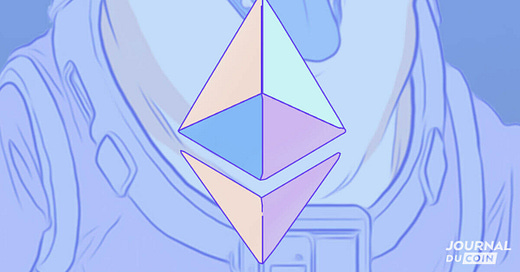



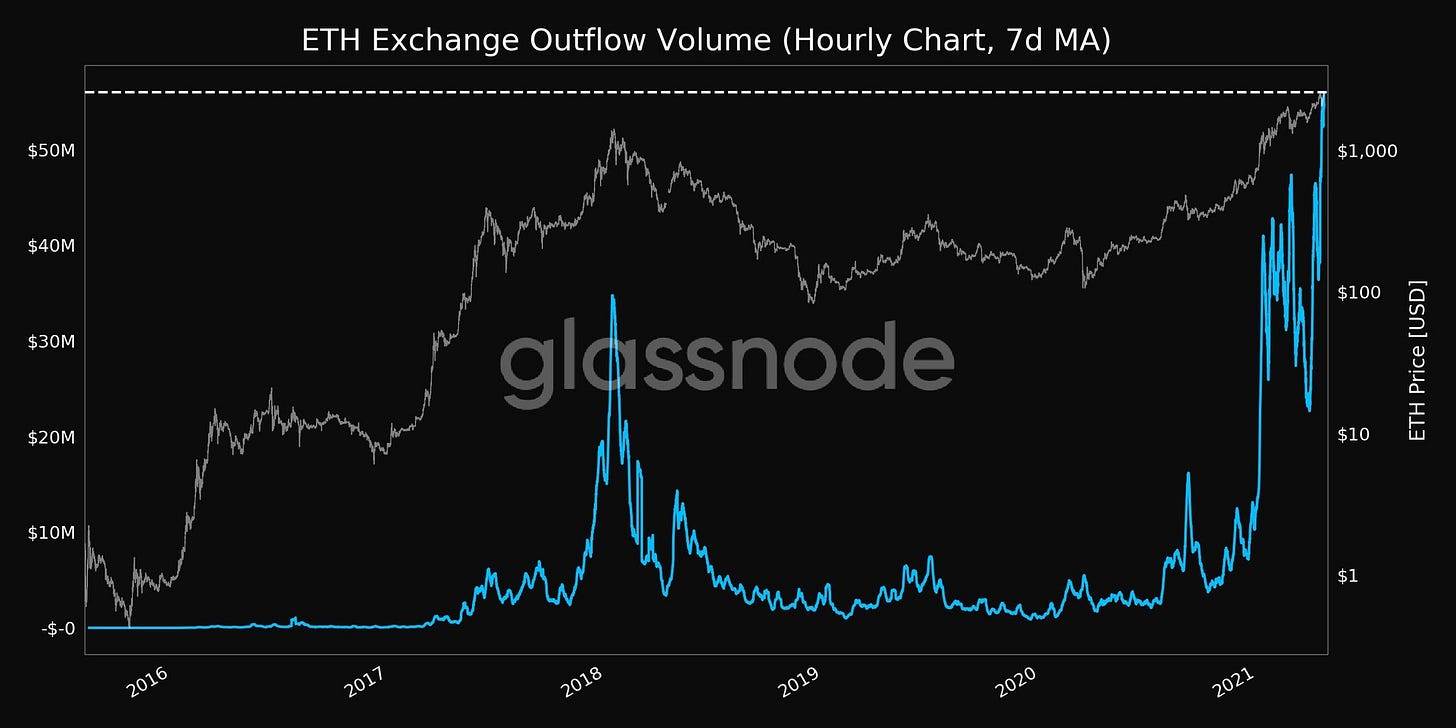
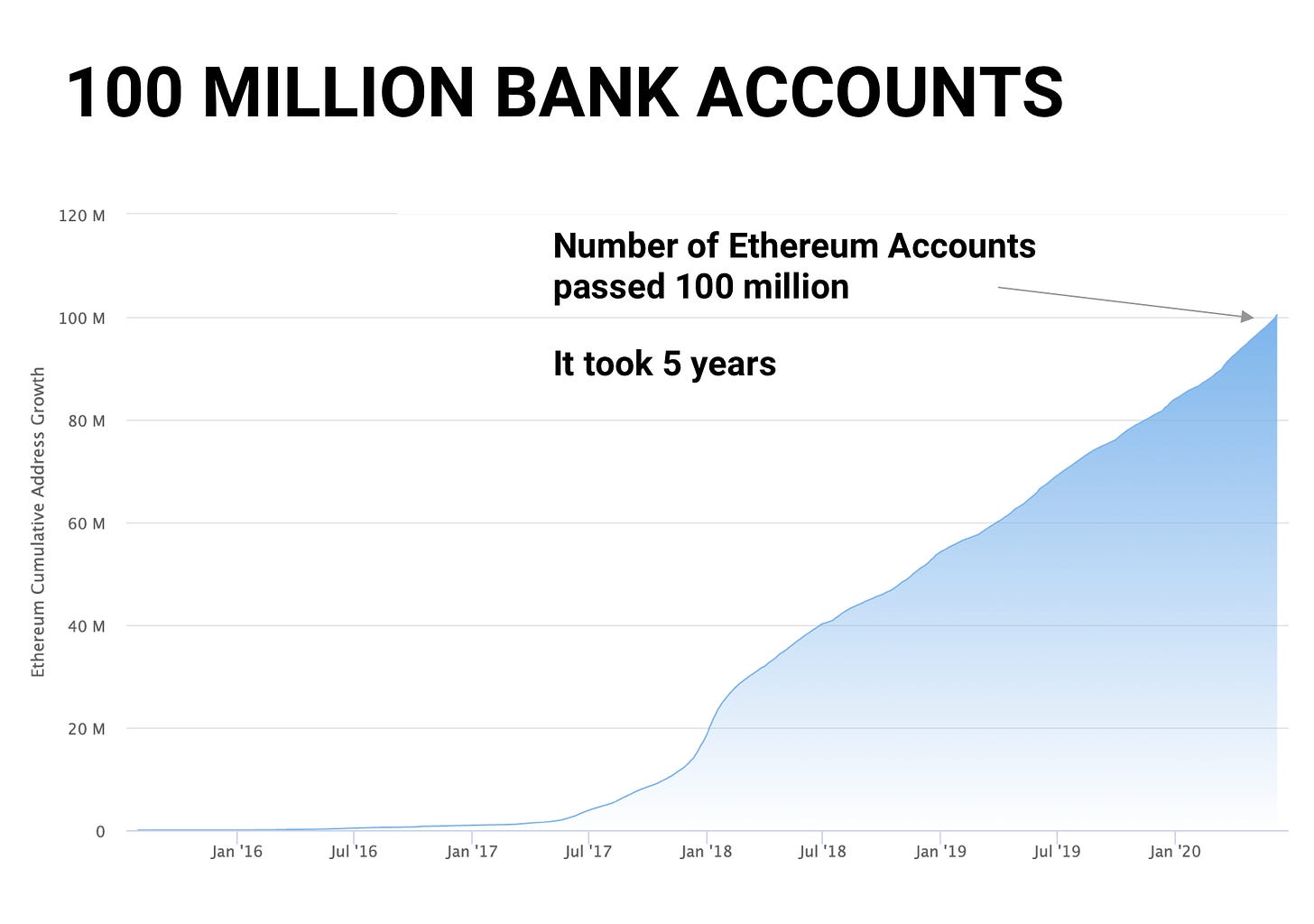

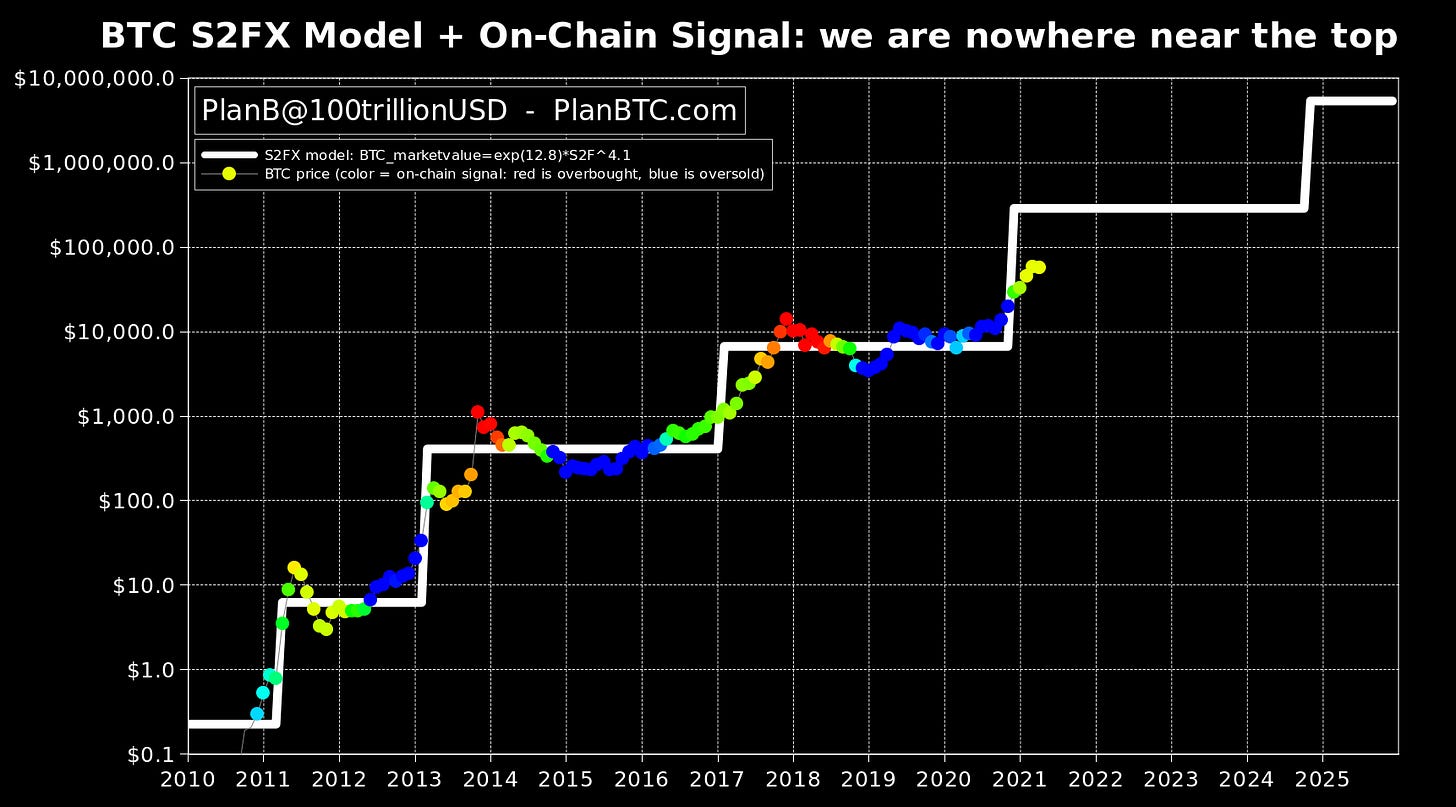
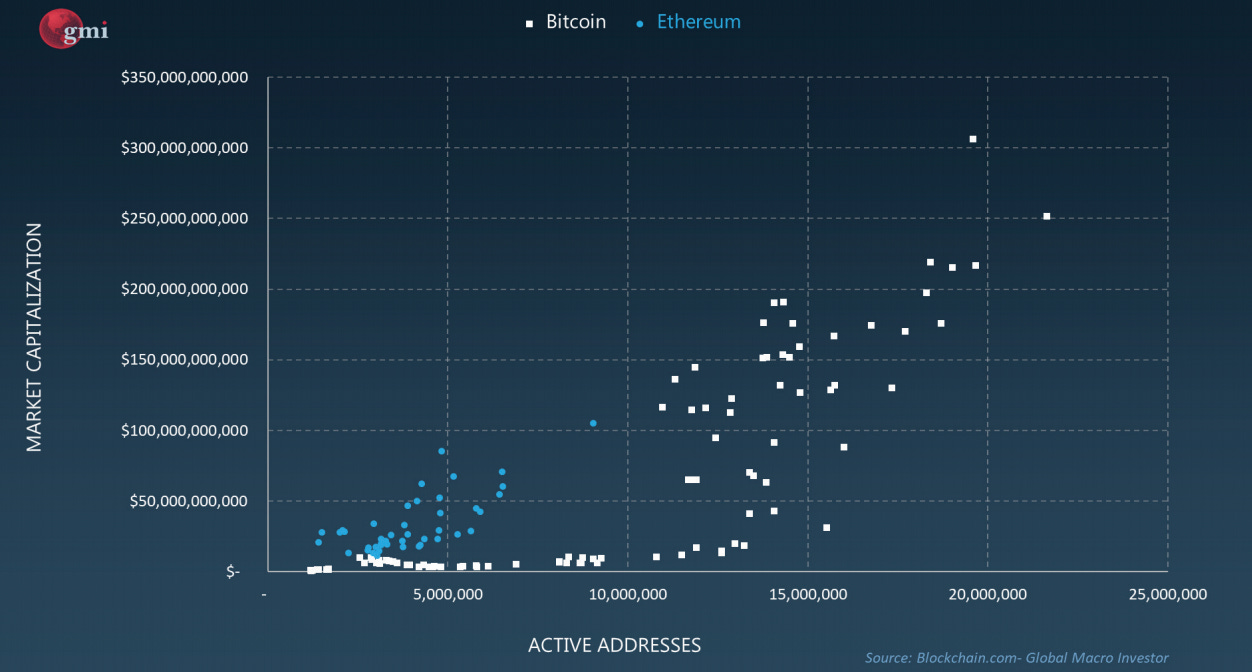


Sorry I missed the question and answer. Just signed up today. I didn't read your email until this afternoon. You really hit ETH on the nail. Today ETH might have hit $ 3,500.00 I own some and now I will buy more. Thanks Joe Hendrickson Ps. will I be able to listen to the call by a recording?